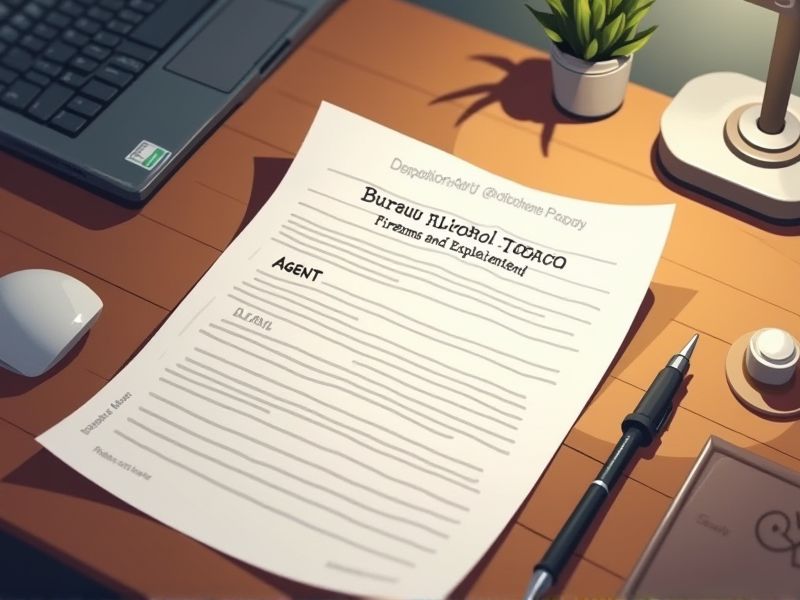
The role of an ATF agent involves complex investigations, requiring expertise in diverse areas of law enforcement. Proficiency in handling firearms and knowledge about tobacco and alcohol regulations are critical due to the agency's specialized focus. Certain certifications enhance an agent's ability to effectively manage explosives and ensure public safety. Here are some important certifications you may need as an ATF agent.
Certified Firearms Instructor
Certified Firearms Instructors provide specialized training that ensures agents handle weapons responsibly and competently. The heightened proficiency reduces the risk of accidents or misuse during operations. Trainers' expertise equips agents with the skills necessary for diverse and unpredictable field situations. Such certification aligns with regulatory standards and enhances public and agent safety.
Explosives Safety and Handling Certification
Explosives Safety and Handling Certification is crucial for ATF agents due to the high-risk nature of their duties involving potential exposure to explosive materials. Proper certification equips agents with essential skills to prevent accidents and ensure public safety when handling or disarming explosives. Rigorous training reduces the probability of mishandling, which could lead to dangerous incidents or loss of life. The certification ensures that agents can effectively enforce laws and regulations pertaining to explosives, maintaining national security and public trust.
Tactical Operations Certification
Tactical Operations Certification equips Bureau of Alcohol, Tobacco, Firearms, and Explosives (ATF) agents with specialized skills necessary for high-risk enforcement operations. The certification ensures agents are proficient in handling complex situations, which reduces the likelihood of accidents or unintended harm during missions. It also enhances the agency's capability to respond effectively to threats, thereby increasing public safety. The certification creates a standard of expertise, fostering consistency and readiness among agents in critical scenarios.
Critical Incident Response Certification
Bureau of Alcohol, Tobacco, Firearms and Explosives (ATF) agents frequently encounter high-stakes, volatile situations where rapid, informed decision-making is crucial; Critical Incident Response Certification provides the necessary training to manage these scenarios effectively. Certified agents develop specialized skills in crisis negotiation, tactical operations, and incident command, which enhances their operational readiness. The certification ensures agents can navigate complex incidents like active shooter situations and bomb threats, minimizing potential harm to the public and themselves. The program equips agents with up-to-date legal and procedural knowledge, allowing for adherence to federal guidelines and improving coordination with local law enforcement.
Counterterrorism and Intelligence Analysis Certification
Bureau of Alcohol, Tobacco, Firearms and Explosives (ATF) agents often face complex threats that intersect with terrorism, making counterterrorism knowledge crucial. Understanding intelligence analysis enhances an agent's ability to interpret data and foresee potential threats effectively. The certification provides agents with tools to combat illegal firearms trafficking, often linked to terrorist activities. Expertise gained ensures agents are equipped to collaborate with other agencies in intelligence sharing and threat mitigation.
Hostage Negotiation Certification
Hostage negotiation certification equips Bureau of Alcohol, Tobacco, Firearms, and Explosives (ATF) agents with critical communication skills vital for de-escalating high-stakes situations. In crises involving firearms or volatile substances, trained negotiators can effectively reduce risk of harm to hostages and perpetrators. Agents with certification can make informed decisions, drawing upon psychological principles to guide their tactics. The credential ensures a standardized proficiency in managing tense scenarios, directly impacting mission success and public safety.
Evidence Handling and Crime Scene Investigation Certification
Certification in evidence handling and crime scene investigation ensures that agents maintain the integrity of the investigative process, which directly impacts the accuracy of legal outcomes. Proper training reduces the risk of evidence contamination or loss, which can lead to wrongful convictions or case dismissals. Certification equips agents with standardized procedures crucial for federal investigations involving firearms, explosives, tobacco, and alcohol. Knowledgeable agents enhance the Bureau's reputation and effectiveness, fostering trust in their investigative capabilities.
Defensive Driving Certification
Defensive Driving Certification equips Bureau of Alcohol, Tobacco, Firearms and Explosives Agents with the skills to safely navigate high-risk situations, such as pursuits or tactical maneuvers, reducing the likelihood of accidents. This certification improves agents' responses to unpredictable scenarios, ensuring public safety and mission success. Thorough training in defensive driving promotes better decision-making under pressure, minimizing potential liabilities for the agency. Enhanced driving skills also contribute to prolonged vehicle lifespan and reduced operational costs due to fewer incidents.
Cybercrime Investigation Certification
The rise in digital tools used in criminal activities necessitates that Bureau of Alcohol, Tobacco, Firearms, and Explosives (ATF) agents possess cybercrime investigation proficiency. Cybercrime Investigation Certification equips agents with the skills to effectively track, analyze, and interpret electronic evidence, which is frequently involved in modern-day crimes. As firearms and explosives transactions increasingly shift to online platforms, understanding digital footprints becomes essential in preventing illegal activities. Training agents in cybercrime investigation strengthens the bureau's overall ability to combat sophisticated criminal networks that exploit technology.
Emergency Medical Technician Certification
Emergency Medical Technician (EMT) certification equips Bureau of Alcohol, Tobacco, Firearms and Explosives (ATF) agents with essential medical skills for immediate response during field operations. Undercover and enforcement scenarios often present high-risk situations where emergency medical care can be crucial. EMT training enhances agent preparedness for injuries or medical emergencies, reducing potential casualties. Knowledge in emergency medical care supports community safety, aligning with the agency's public protection mission.
Summary
When you engage with a certified Bureau of Alcohol, Tobacco, Firearms, and Explosives (ATF) agent, you can expect enhanced proficiency in regulatory compliance and enforcement. Certifications can increase the agent's ability to manage complex investigations involving illicit activities. This specialized training equips agents to better collaborate with law enforcement partners, thereby improving outcomes in crime prevention. A more informed approach reduces errors, increasing public trust in regulatory processes.
